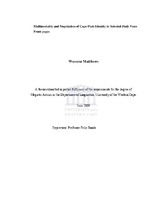Multimodality and Negotiation of Cape Flats Identity in Selected Daily Voice Front pages
Abstract
This thesis explores the social semiotic relationship of visual and verbal signs of the Daily Voice tabloid as a way to show how the social context influences meaning of the signs used in its multimodal frontpages. The Daily Voice tabloid largely uses Kaapse English/ Afrikaans as spoken by Coloureds on the Cape Flats on its frontpages rather than standard English or standard Afrikaans associated with White people. The study assumes that the meaning constructed by and through the verbal and visual signs on the Daily Voice frontpages is interdependent on the relationship the multimodal texts have with the largely Cape Flats readership. This study maintains the importance of the idea of the localisation of meaning in socio-cultural specific contexts throughout. I conclude that Kress and Van Leeuwen’s (1996/2006) design could be extended beyond Westernised contexts and that marginalised discourses such as those unique to the Cape Flats are not static, but indeed dynamic. I also extend the appraisal theory by Martin and White (2005) to marginalised bilingual discourse and establish that Appraisal theory can be used to not only evaluate verbal discourse but also that visual discourse needs to be considered as a tool within the appraisal framework. I also conclude by suggesting a monolectal view of Kaapse English/Afrikaans discourse. That is, the meaning potential of Kaapse English/Afrikaans by Cape Flats speakers would be lost if perceived or analysed as emanating from two languages, (White) English and (White) Afrikaans. Therefore the conclusion is that the Daily Voice uses Kaapse English/Afrikaans as is used in Cape Flats socio-cultural contexts to construct meaning-making options across its frontpages.

